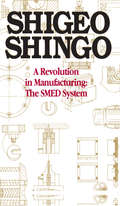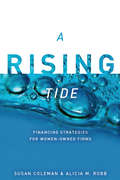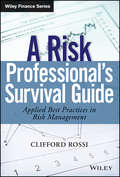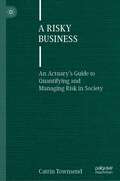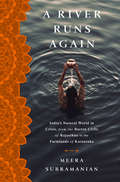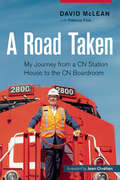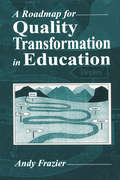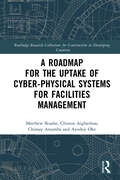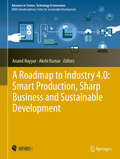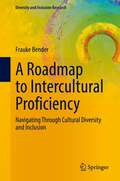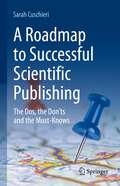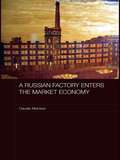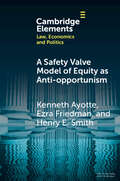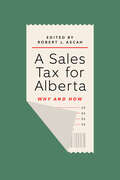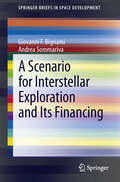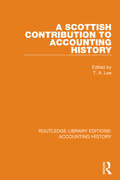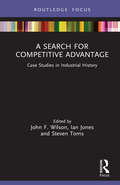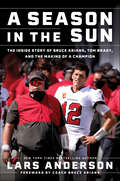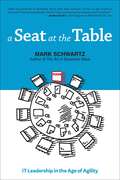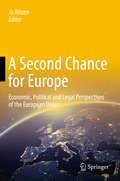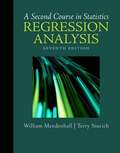- Table View
- List View
A Revolution in Manufacturing: The SMED System
by Shigeo ShingoWritten by the industrial engineer who developed SMED (single-minute exchange of die) for Toyota, A Revolution in Manufacturing provides a full overview of this powerful just in time production tool. It offers the most complete and detailed instructions available anywhere for transforming a manufacturing environment in ways that will speed up produ
A Rising Tide: Financing Strategies for Women-Owned Firms
by Susan Coleman Alicia M. RobbWomen-owned firms represent an increasingly important segment of the small business sector. According to the most recent data from the U. S. Census Bureau, there were 7. 8 million women-owned firms in the United States in 2007, generating $1. 2 trillion in revenues and providing employment for 7. 6 million people. A Rising Tidepresents the financial strategies that have helped today's bold and creative women entrepreneurs to succeed. The authors take a "lifecycle approach" in discussing the issues and strategies for different types of women-owned firms, from nascent and home-based firms to growth-oriented and technology-based enterprises. Each chapter includes real-world cases studies featuring women entrepreneurs as a way to bring the book's lessons to life. Uniquely, this book ties together the latest research on financing women-owned businesses and its implications for actual or potential entrepreneurs. Drawing on the Kauffman Firm Survey, a longitudinal survey of over 4,000 new firms, the authors are able to provide particularly useful conclusions, making this a must read for the thousands of women who are starting or may start businesses in the next few years.
A Risk Professionals Survival Guide
by Clifford RossiBalanced, practical risk management for post - financial crisis institutionsFundamentals of Risk Management fills a critical gap left by existing risk management texts. Instead of focusing only on quantitative risk analysis or only on institutional risk management, this book takes a comprehensive approach. The disasters of the recent financial crisis taught us that managing risk is both an art and a science, and it is critical for practitioners to understand how individual risks are integrated at the enterprise level.This book is the only resource of its kind to introduce all of the key risk management concepts in a cohesive case study spanning each chapter. A hypothetical bank drawn from elements of several real world institutions serves as a backdrop for topics from credit risk and operational risk to understanding big-picture risk exposure. You will be able to see exactly how each rigorous concept is applied in actual risk management contexts. Fundamentals of Risk Management includes:Supplemental Excel-based Visual Basic (VBA) modules, so you can interact directly with risk modelsClear explanations of the importance of risk management in preventing financial disastersReal world examples and lessons learned from past crisesRisk policies, infrastructure, and activities that balance limited quantitative modelsThis book provides the element of hands-on application necessary to put enterprise risk management into effective practice. The very best risk managers rely on a balanced approach that leverages every aspect of financial operations for an integrative risk management strategy. With Fundamentals of Risk Management, you can identify and control risk at an expert level.
A Risky Business: An Actuary’s Guide to Quantifying and Managing Risk in Society
by Catrin TownsendIntangible, invisible and worth trillions, risk is everywhere. Its quantification and management are key to the success and failure of individuals, businesses and governments. Whether you’re an interested observer or pursuing a career in risk, this book delves into the complex and multi-faceted work that actuaries undertake to quantify, manage and commodify risk—supporting our society and servicing a range of multi-billion-dollar industries. Starting at the most basic level, this book introduces key concepts in actuarial science, insurance and pensions. Through case studies, explanations and mathematical examples, it fosters an understanding of current industry practice. This book celebrates the long history of actuarial science and poses the problems facing actuaries in the future, exploring complex global risks including climate change, aging populations, healthcare models and pandemic epidemiology from an actuarial perspective. It gives practical advice for new and potential actuaries on how to identify an area of work to go into, how best to navigate (and pass!) actuarial exams and how to develop your skills post-qualification. A Risky Business illuminates how actuaries are central to society as we know it, revealing what they do and how they do it. It is the essential primer on actuarial science.
A River Runs Again: India's Natural World in Crisis, from the Barren Cliffs of Rajasthan to the Farmlands of Karnataka
by Meera SubramanianCrowded, hot, subject to violent swings in climate, with a government unable or unwilling to face the most vital challenges, the rich and poor increasingly living in worlds a∂ for most of the world, this picture is of a possible future. For India, it is the very real present. In this lyrical exploration of life, loss, and survival, Meera Subramanian travels in search of the ordinary people and microenterprises determined to revive India’s ravaged natural world: an engineer-turned-farmer brings organic food to Indian plates; villagers resuscitate a river run dry; cook stove designers persist on the quest for a smokeless fire; biologists bring vultures back from the brink of extinction; and in Bihar, one of India’s most impoverished states, a bold young woman teaches adolescents the fundamentals of sexual health. While investigating these five environmental challenges, Subramanian discovers the stories that renew hope for a nation with the potential to lead India and the planet into a sustainable and prosperous future.
A Road Taken
by David Mclean Patricia FinnNineteen years ago, David McLean was appointed by the prime minister of Canada to the board of directors of CN, after which he was elected chairman. McLean has been reelected each year and will retire in April 2014. In A Road Taken, the longest-serving chairman of the board in CN history explains complex business issues in very human terms. McLean's stories include his leadership role in the privatization of the company and the intrigue and egos in the behind-the-scenes race to launch the biggest IPO in Canadian history at that time. They also include the adventure and challenge of a prairie childhood, a university education fuelled by team sports and ambition, and a successful career in law and business. McLean plumbs the depths and delivers a treatise on leadership in business and life that is as moving as it is honest.
A Roadmap for Quality Transformation in Education: A Guide for Local Education Reform Leaders
by Ncafe Nc Awards ExcellenceWhen it comes to educational performance, the United States does not fare well in comparison to our global competitors. Numerous challenges, such as our increasing dependence on technology, and the ongoing difficulties we face in providing cost-effective, good quality public education, point to the need for changes in our educational system if we are to provide a competitive workforce in the future.
A Roadmap for the Uptake of Cyber-Physical Systems for Facilities Management (Routledge Research Collections for Construction in Developing Countries)
by Clinton Aigbavboa Ayodeji Oke Matthew Ikuabe Chimay J AnumbaThis is the first book to conceptualise and develop a roadmap for the adoption of cyber-physical systems (CPS) for facilities management (FM) in developing countries. It is argued that effective use of CPS can help to significantly improve issues such as extended processing time, poor data acquisition, ineffective coverage of facility maintenance history, and poor-quality control within the facilities management sector. Through a theoretical review of relevant technology adoption models and frameworks, A Roadmap for the Uptake of Cyber-Physical Systems for Facilities Management provides a clear insight into the required parameters for integrating CPS into facilities management. The book will be beneficial to relevant stakeholders who face the responsibility of facilities and construction management as it contributes to the growing demand for the adoption of digital technologies in the delivery and management of built infrastructure. Furthermore, it serves as a solid theoretical base for researchers and academics in the quest to expand the existing borderline on construction digitalisation, especially in the post-occupancy stage.
A Roadmap to Industry 4.0: Smart Production, Sharp Business and Sustainable Development (Advances in Science, Technology & Innovation)
by Akshi Kumar Anand NayyarBusiness innovation and industrial intelligence are paving the way for a future in which smart factories, intelligent machines, networked processes and Big Data are combined to foster industrial growth. The maturity and growth of instrumentation, monitoring and automation as key technology drivers support Industry 4.0 as a viable, competent and actionable business model. This book offers a primer, helping readers understand this paradigm shift from industry 1.0 to industry 4.0. The focus is on grasping the necessary pre-conditions, development & technological aspects that conceptually describe this transformation, along with the practices, models and real-time experience needed to achieve sustainable smart manufacturing technologies. The primary goal is to address significant questions of what, how and why in this context, such as:What is Industry 4.0?What is the current status of its implementation?What are the pillars of Industry 4.0?How can Industry 4.0 be effectively implemented?How are firms exploiting the Internet of Things (IoT), Big Data and other emerging technologies to improve their production and services?How can the implementation of Industry 4.0 be accelerated?How is Industry 4.0 changing the workplace landscape?Why is this melding of the virtual and physical world needed for smart production engineering environments?Why is smart production a game-changing new form of product design and manufacturing?
A Roadmap to Intercultural Proficiency: Navigating Through Cultural Diversity and Inclusion (Diversity and Inclusion Research)
by Frauke BenderThis book describes the linkage between the worlds of culture and inclusion based on the concept of intercultural proficiency (IP). It explains the building blocks of intercultural proficiency by providing a conceptual framework that combines and structures the existing knowledge base and extends it by incorporating the author’s own empirical research work. The framework presents not only a comprehensive and universal model based on existing concepts but also implications for learning and teaching strategies. This book and the IP concept provide guidance for students, early working professionals as well as seasoned working professionals on how to thrive and succeed when interacting with different cultures. It allows us to think outside our narrow cultural boundaries and decode complex cross-cultural interactions. Thus, the IP approach can be applied in academic and corporate settings, as it facilitates potential for solution of the issues associated with multicultural workforces and global operations of organizations.
A Roadmap to Successful Scientific Publishing: The Dos, the Don’ts and the Must-Knows
by Sarah CuschieriIn the age of "publish or perish," this book provides everything one needs to know about conducting research and successfully publishing it in a scientific journal. The reader learns about the complete process of scientific publishing: from selecting the most appropriate research design, to obtaining permissions and funding, to resourcefully presenting the research results in a poster and oral presentation. Additionally, the practical tips provided here help the reader formulate a compelling scientific article and choose the most suitable journal (subscription vs. the various open access modalities) for their publication.This book also addresses "invisible aspects" of scholarly publishing that are nonetheless important and that everyone should know and understand: avoiding predatory journals, understanding the editor's perspective, and becoming familiar with the various research metrics (from author to journal) that can all determine success or failure of a publication. Written in an informal style in which the author shares personal perspectives and experiences, the book is easily accessible to the reader. The book offers early career scientists in biomedicine and medicine a unique perspective on publishing research articles and how this process can enhance the authors' "scientific value" within the scientific ecosystem as well as their personal CVs.
A Rule-Based Medium-Term Fiscal Policy Framework for Tanzania
by Mika Saito Daehaeng KimA report from the International Monetary Fund.
A Russian Factory Enters the Market Economy (Routledge Contemporary Russia and Eastern Europe Series #Vol. 11)
by Claudio MorrisonThis book charts the experiences of a textile enterprise in Russia during the 1990s, analysing post-Soviet management and managerial practices in order to illuminate the content, nature and direction of industrial restructuring in the Russian privatised sector during the years of economic transition. Based on extensive factory-level fieldwork, it focuses upon changes in ownership, management and labour organisation, unveiling the complex texture of social, communal and gender relations in the workplace over an extended period of time, including through crisis and bankruptcy, acquisition by new capitalist owners and attempted restructuring. It argues, contrary to dominant Western managerial theories which blame the failure of transition on the irrationality of Russian managerial strategies, that the rationale for the continued reliance on Soviet era managerial practices lay in the peculiar form of social relations in the workplace which were characteristic of the Soviet system. It engages with key issues, often neglected in the literature, such as social domination, power and conflict, that capture the problematic and open-ended character of social and economic transformation in post-Soviet production. It demonstrates that far from a simple transition to a market economy, the post-Soviet transition has reproduced most of the features of the old Soviet system, including its patterns of labour relations.
A Safe Place for Dangerous Truths: Using Dialogue to Overcome Fear and Distrust at Work
by Annette SimmonsNo more "checking for feet." This illuminating guide gets people to tell the truth at the meeting--not in the bathroom afterwards.Almost everybody does it--lie, that is. In one recent survey 93% of people admitted to lying regularly at work! Why? Because it's safer than telling the truth.Sadly, organizations cannot succeed in this poisonous world of half-truths, strategic omissions, and doctored information. To function optimally, businesses must create an environment where people feel free to tell the truth, no matter how disturbing. Only then can organizations unleash the responsiveness, creativity, and enthusiasm necessary to achieve their goals.This unique book shows how, using the formal process of "dialogue," such a place can be built. In a lively discussion, the author shows managers how to use this technique to encourage truth-telling by reducing fear, prompting self-examination, and opening minds * build trust where suspicion and cynicism held sway * inspire individuals to think and learn as a group * help groups talk through tough issues and move to collaborative action.
A Safety Valve Model of Equity as Anti-opportunism (Elements in Law, Economics and Politics)
by Kenneth Ayotte Ezra Friedman Henry E SmithEquity can be defined as the use of a more flexible, morally judgmental, and subjective mode of legal decision making that roughly corresponds with historical equity. This Element presents a simple contracting model that captures the role of equity as a safety valve, and shows how it can solve problems posed by opportunists–agents with unusual willingness and ability to take advantage of necessary imperfections in the law. In this model, a simple but imperfect formal legal regime is able to achieve first best in the absence of opportunists. But when opportunists are added, a more flexible regime (equity), can be preferred. However, equity is also vulnerable to being used opportunistically by the parties it intends to protect. Hence, the Element shows that it is often preferable to limit equity, reserving it for use only against those who appear sufficiently likely to be opportunists.
A Sales Tax for Alberta: Why and How
by Elizabeth Smythe Melville McMillan Graham Thomson Ergete Ferede Ian Glassford Kenneth J. McKenzie Trevor W. HarrisonThe days of buoyant capital investment, jobs, and wealth are passing Alberta by as the boom-and-bust cycle runs its course and the global climate crisis becomes more acute. As the province scrambles to boost the dying oil economy and curb spending, one solution is all but ignored—a sales tax. In this collection, Alberta scholars and policy experts map out why and how a provincial sales tax can and should be implemented. They examine energy revenues, household incomes, and political support as well as opportunities for improving democracy and reducing the volatility of government revenues. Finally, this volume offers recommendations on structuring a consultative review process to improve Alberta’s long-term fiscal sustainability. Contributions by Ergete Ferede, Ian Glassford, Kenneth J. McKenzie, Melville McMillan, Elizabeth Smythe, and Graham Thomson.
A Scenario for Interstellar Exploration and Its Financing (SpringerBriefs in Space Development)
by Giovanni F. Bignami Andrea SommarivaThis book develops a credible scenario for interstellar exploration and colonization. In so doing, it examines: * the present situation and prospects for interstellar exploration technologies; * where to go: the search for habitable planets; * the motivations for space travel and colonization; * the financial mechanisms required to fund such enterprises. The final section of the book analyzes the uncertainties surrounding the presented scenario. The purpose of building a scenario is not only to pinpoint future events but also to highlight the uncertainties that may propel the future in different directions. Interstellar travel and colonization requires a civilization in which human beings see themselves as inhabitants of a single planet and in which global governance of these processes is conducted on a cooperative basis. The key question is, then, whether our present civilization is ready for such an endeavor, reflecting the fact that the critical uncertainties are political and cultural in nature. It is written in such a way as to allow the non-professional reader to become part of the debate on the future of space programs.
A Scottish Contribution to Accounting History (Routledge Library Editions: Accounting History #37)
by T. E. LeeThis book, first published in 1986, is a celebration of Scottish accounting influence and tradition. The essays are critical contributions to the study of accounting history, split into two main sections: the development of accounting thought and practice prior to the emergence of a regulated accountancy profession; and the problems faced in the first 70 years of the accountancy profession.
A Seamless Argument: Real World Strategies for Syndicating Recommendations, Understanding Managers' Motives, and Preparing an Organization for Change
by Jay Barney Patricia Gorman Clifford"What I Didn't Learn in Business School" is a fictional account that follows new consultant Justin Campbell as he joins an elite consulting team hired by a chemical firm to assess the potential of a newly developed technology. Collecting data, analyzing information, and developing a strategy are core components of Justin's job. The most important part, however, is selling his ideas. Unfortunately, and especially for recent business school graduates, that is a very difficult skill to learn. In this chapter, follow Justin and his team as they prepare to sell their carefully tested strategic recommendations to their client. As they craft their presentation, they must anticipate the motivations and potential objections of the firm's managers, develop strategies for gaining buy-in, and lay the groundwork for change. This chapter was originally published as Chapter 13 of "What I Didn't Learn in Business School: How Strategy Works in the Real World."
A Search for Competitive Advantage: Case Studies in Industrial History (Routledge Focus on Industrial History)
by John F. Wilson; Steven Toms; Ian JonesThis shortform book presents key peer-reviewed research selected by expert series editors and contextualised by new analysis from each author on how British industrial firms achieved a competitive advantage. With contributions on industrial cartelisation, organisational structure, the quality of British management, marketing and trade marks, labour relations, and technological innovation, this volume provides an array of fascinating insights into industrial history. Of interest to business and economic historians, this shortform book also provides analysis and illustrative case-studies that will be valuable reading across the social sciences.
A Season in the Sun: The Inside Story of Bruce Arians, Tom Brady, and the Making of a Champion
by Lars AndersonWITH A FOREWORD BY COACH BRUCE ARIANSThe extraordinary behind-the-scenes story of how Coach Bruce Arians, Tom Brady, and the Tampa Bay Buccaneers came together to deliver one of the most improbable Super Bowl victories in NFL history.The pursuit was so shrouded in secrecy that it was referred to within the Tampa Bay Buccaneers’ organization by codename: Operation Shoeless Joe Jackson. Indeed, the prospect of Tom Brady, six-time Super Bowl champion and widely-acknowledged greatest football player ever, joining the Bucs, a historically hapless franchise that hadn’t made the playoffs in more than a decade, seemed about as likely as Jackson emerging out of an Iowa cornfield in the movie Field of Dreams.But come Brady did. At age forty-three, pushing the boundaries of football mortality and without Bill Belichick by his side for the first time in his NFL career, this would be the ultimate test for the ultimate football legacy. Brady’s new coach, Bruce Arians, also had much to prove. One of the great offensive minds of his generation, Arians returned to coaching in 2018, at the age of 65, in search of the one achievement that had eluded him throughout his illustrious career: a Super Bowl championship. Together, like so many aged snowbirds, Brady and Arians had decamped to Florida to make the most of their remaining years.Renowned sports journalist Lars Anderson was granted extraordinary access to the inner workings of the Bucs’ organization. The result is a remarkable work of sports journalism, peppered with wild inside stories and new insights into Brady, Arians, and the Bucs. From the practice facility to the team plane, from the garage where Brady treats his footballs to the huddle on gameday, Anderson captures the rhythms of perhaps the strangest NFL season ever, turned upside down by the COVID-19 pandemic. In his telling, the Bucs’ quest for one glorious season in the sun becomes a riveting sports epic.
A Seat at the Table and The Art of Business Value
by Mark SchwartzA Seat at the Table: Agile, Lean, and DevOps approaches are radical game-changers. They provide a fundamentally different way to think about how IT fits into the enterprise, how IT leaders lead, and how IT can harness technology to accomplish the objectives of the enterprise. But honest and open conversations are not taking place at the interface between management and Agile delivery teams. In A Seat at the Table, CIO Mark Schwartz explores the role of IT leadership as it is now and the role of IT leadership as it should be—an integral part of the value creation engine.Asking two critical questions, how can IT harness Agility to achieve the best value for the enterprise and how can IT redefine its relationship with the enterprise to maximize this value, and in the process, earn that seat at the table, Schwartz shows that the only way to become an Agile IT leader in today&’s world is to be courageous—to throw off many of the attitudes and assumptions that have left CIOs struggling to gain a seat at the table, to proceed in bold strokes, and to lead the enterprise in seizing opportunities to create business value through technology.The Art of Business Value: Do you really understand what business value is? Information technology can and should deliver business value. But the Agile literature has paid scant attention to what business value means—and how to know whether or not you are delivering it. This problem becomes ever more critical as you push value delivery toward autonomous teams and away from requirements &“tossed over the wall&” by business stakeholders. An empowered team needs to understand its goal!Playful and thought-provoking, The Art of Business Value explores what business value means, why it matters, and how it should affect your software development and delivery practices. More than any other IT delivery approach, DevOps (and Agile thinking in general) makes business value a central concern. This book examines the role of business value in software and makes a compelling case for why a clear understanding of business value will change the way you deliver software.This book will make you think deeply about not only what it means to deliver value but also the relationship of the IT organization to the rest of the enterprise. It will give you the language to discuss value with the business, methods to cut through bureaucracy and strategies for incorporating Agile teams and culture into the enterprise. Most of all, this book will startle you into new ways of thinking about the cutting-edge of Agile practice and where it may lead.
A Seat at the Table: IT Leadership in the Age of Agility
by Mark SchwartzAgile, Lean, and DevOps approaches are radical game changers, providing a fundamentally different way to think about how IT fits into the enterprise, how IT leaders lead, and how IT can harness technology to accomplish the objectives of the enterprise. But honest and open conversations are not taking place between management and Agile delivery teams.In A Seat at the Table, CIO Mark Schwartz explores the role of IT leadership as it is now and opens the door to reveal IT leadership as it should be—an integral part of the value creation engine. With an easy style, Schwartz reveals that the only way to become an Agile IT leader is to be courageous—to throw off the attitude and assumptions that have kept CIOs from taking their rightful seat at the table. CIOs, step on up, your seat at the table is waiting for you.
A Second Chance for Europe: Economic, Political and Legal Perspectives of the European Union
by Jo RitzenThis book calls upon us to rethink and reboot the European Union. The authors dissect the EU's many vulnerabilities: how some Member States are backsliding on the rule of law, freedom of the press, and control of corruption - and how globalization's 'discontents' are threatening the liberal international order. It examines the need for a common immigration policy; the need to rethink the unsustainable debt overhang of some Eurozone countries; and the need to use education to foster a European identity. Given the sum total of these vulnerabilities, the book argues, the EU may not survive beyond 2025 in its present form - that is, unless decisive action is taken. In turn, the book puts forward a number of workable solutions: a European economic model to secure full employment; a stronger European Court of Human Rights to counter systemic violations; a points-based immigration policy; clear exit options for the Eurozone; and an Open Education Area with a common second language. These solutions may reduce the number of EU countries, but would increase cohesion and overall survivability.
A Second Course In Statistics: Regression Analysis
by Terry Sincich William MendenhallA Second Course in Statistics: Regression Analysis, Seventh Edition, focuses on building linear statistical models and developing skills for implementing regression analysis in real situations. This text offers applications for engineering, sociology, psychology, science, and business. The authors use real data and scenarios extracted from news articles, journals, and actual consulting problems to show how to apply the concepts. In addition, seven case studies, now located throughout the text after applicable chapters, invite readers to focus on specific problems.
